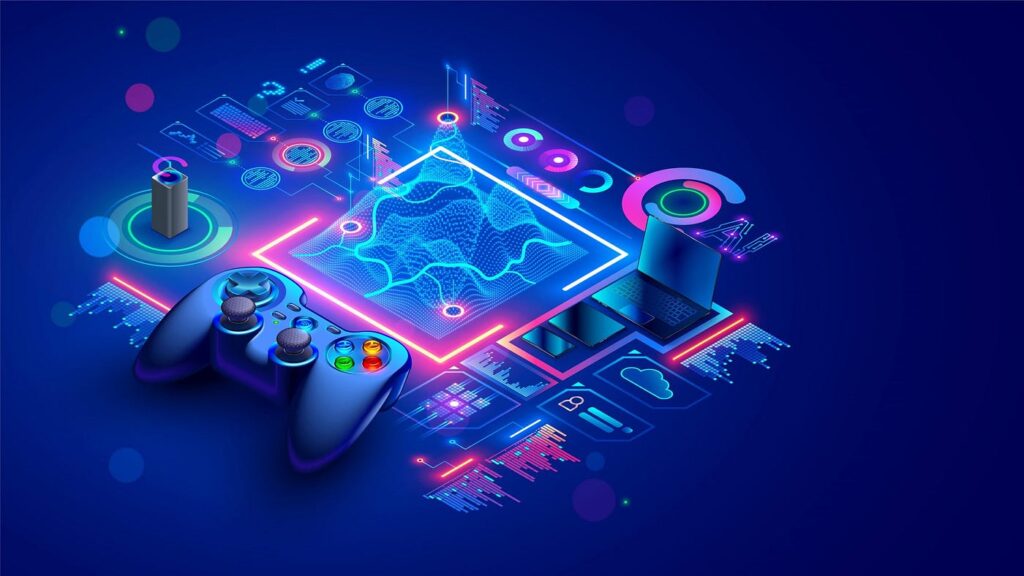-
AI in game development offers tools and solutions that enhance creativity, efficiency, and player experiences.
-
Nvidia AI gaming tools and generative AI are revolutionizing content creation, enabling developers to create more immersive and dynamic gaming experiences.
-
Concerns such as copyright infringement, energy consumption, and AI job displacement are significant challenges that need addressing.
The rapid evolution of AI technologies is transforming various industries, and game development is no exception.
While AI in game development promises unprecedented creativity, efficiency, and enhanced player experiences, it also brings a wave of uncertainty for developers.
This article dives into the multifaceted impact of AI on game development, exploring the opportunities, challenges, and complex future landscape it is creating.
How AI is Fueling Uncertainty for Game Developers
AI in game development has proved to be a game-changer, offering tools and solutions that make the process smoother, faster, and more creative. From non-playable character (NPC) behavior to dynamic storytelling, AI enhances game design in unimaginable ways.
AI’s capability to analyze vast amounts of data enables developers to create more immersive and dynamic gaming experiences. For instance, AI-driven NPCs can adapt to real-time player actions, providing a more engaging and unpredictable gameplay experience.
Games like “Middle-earth: Shadow of Mordor” have successfully implemented AI to create unique and challenging encounters, making each playthrough distinct.
Also, Read: Meta Integrates Generative AI to Transform Metaverse Gaming Experiences.
AI Tools for Developers
Nvidia AI gaming tools have become one of the key enablers in this transformation. These advanced tools help developers streamline processes, automate repetitive tasks, and focus on creativity.
For example, Nvidia’s DLSS (Deep Learning Super Sampling) technology enhances game graphics while reducing the computational load, thus improving overall performance.
A case study from a leading game development studio showcases how Nvidia AI gaming tools reduced their rendering times by half, allowing their team to dedicate more time to refining gameplay mechanics and narrative elements.

Generative AI in gaming is another groundbreaking advancement, particularly in content creation. This technology can autonomously generate game levels, characters, and even entire story arcs, pushing the boundaries of what games can offer players.
Revolutionizing Content Creation
Generative AI can create vast, procedurally generated worlds with minimal human intervention. Games like “No Man’s Sky” use generative AI to make its virtually infinite universe, offering players unique experiences with every new planet they explore.
This technology saves time and enables game developers to provide more prosperous, diverse content without exponentially increasing development costs.
Also, Read: Meta Integrates Generative AI to Transform Metaverse Gaming Experiences.
Concerns and Ethical Considerations
However, the rise of generative AI in gaming is not without its concerns. Issues such as copyright infringement and energy consumption are significant challenges.
Training AI models often require large datasets, sometimes scraped from the internet without proper authorization, raising ethical questions. Unfortunately, we also cannot ignore the environmental impact of running these resource-intensive models.
AI Job Displacement
One of the most pressing issues is AI job displacement. There is growing concern among game developers that AI might replace human roles, particularly in content creation and design tasks.
While AI can handle many repetitive tasks, there is a fear that traditional job roles, especially entry-level positions, may become obsolete. Artists and designers worry they may fix AI-generated content instead of creating original work.
Jess Hyland, a video game artist, voices this concern, stating that AI could shift the nature of creative jobs to more maintenance-oriented roles, stripping away the essence of artistic expression.
Adapting to the New Landscape
The industry must adapt by identifying new roles and skill sets to mitigate these concerns. Training programs focused on AI literacy and creative collaboration with AI tools will be crucial. The goal should be integrating AI as an assistant rather than a replacement, enabling developers to leverage technology for higher creative pursuits.
The Future of AI in Game Development
The future of game development and AI are intertwined in an ever-expanding future of technology. While the technology presents challenges, it also offers immense opportunities for innovation and growth.
The future of game development will require a shift in skills and roles. Developers must proficiently use AI tools and understand their capabilities and limitations.
Composer Borislav Slavov shares his excitement about AI’s potential to enhance music composition, allowing composers to focus on creating profoundly emotional and impactful scores. Such examples highlight how AI can augment human creativity rather than replace it.
Balancing AI and Human Creativity
The industry must balance AI and human creativity to ensure a sustainable future. Despite the backlash against AI in specific gaming communities, as seen with the criticism of “The Finals” for using synthetic voice lines, there is a growing recognition of the value of human touch in game development.
By fostering a collaborative environment where AI supports and enhances human creativity, the gaming industry can continue to thrive.
Conclusion
AI in game development is both a boon and a bane. It offers tools to revolutionize the industry by enhancing creativity, efficiency, and player experiences. However, it also fuels uncertainty regarding job displacement and ethical considerations.
By addressing these concerns and adapting to the changing landscape, the gaming industry can harness the full potential of AI while safeguarding the roles and contributions of human developers.
The future of game development lies in leveraging AI as a powerful ally, ensuring it is an enabler of human creativity rather than its competitor. To explore how AI can transform your game development process, sign up for Jasper and join the forefront of innovation in gaming.
